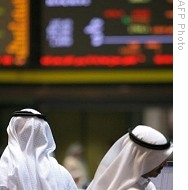VOA标准英语10月-Arab Stock Markets Continue Freefall(在线收听)
 |
| Traders follow market's movement at Stock Exchange in Kuwait City, 08 Oct 2008 |
Traders and investors across the Gulf and the rest of the Arab world stared at their screens in disbelief once again, as losses mounted and markets crashed for a fourth day.
Stock markets in Dubai, Abu Dhabi, Qatar and Egypt were eight to 10 percent lower, while markets in Bahrain, Oman and Saudi Arabia suffered smaller losses. The Saudi exchange lost close to 10 percent at the opening bell, but had recovered to smaller losses, as the day wore on.
In Kuwait, the central bank reacted by lowering interest rates, and the Kuwaiti stock market registered a much smaller loss of just more than one percent.
In Beirut, the Lebanese stock market lost only about one percent, but losses in other Arab markets were the chief topic of discussion among disgruntled investors.
Saudi Arabia, the United Arab Emirates and Kuwait each have major investments in Lebanese real estate and industry, and the meltdown of Gulf stock markets could have a profound, lasting effect on the Lebanese economy.
Beirut Daily Star newspaper columnist Rami Khouri painted a bleak picture of the economic situation in the Arab world in general.
"We now are paying the consequences in terms of the full impact of the rather, I think, incompetent government policies, political and economic policies of the last 30, 40 years," he said, "which did not see the Arab world exploit the opportunity it had with tremendous oil income to diversify economies and provide domestic investment outlets for the Arab money that was sloshing around the Arab world."
Many Arabs from non-oil producing countries like Lebanon, Syria, Egypt and Jordan work in the Gulf, and Khouri foresees a contraction in the amounts of money they send home.
"First people are losing money from their investments abroad, and you are probably talking billions and billions of dollars of lost income," Khouri noted. "Second of all you are going to have slowdowns in some economies in the Gulf, which means that people from other non-oil producing countries that go to the Gulf to work and send their remittances home ... those opportunities will become a little bit less than they were before.
"That will create a slowdown all over the Arab world," he added. "Third of all, you will probably get less investment from the Arab countries in other Arab countries. So you have got all kinds of knock on effects internally within the Arab world, and externally, because of the global financial crisis hitting people's investments, especially government investments overseas. And, as economies contract, you do not have spare capacities within domestic Arab economies to take up the slack, and most importantly, create new jobs."
The Arab daily al Hayat estimates that losses in the seven key stock exchanges in the Gulf at the close of trading Tuesday, totaled $150 billion.